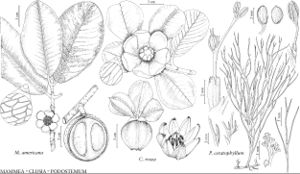Clusia
Sp. Pl. 1: 509. 1753.
Gen. Pl. ed. 5, 225. 1754.
| Taxon | Illustrator ⠉ | |
|---|---|---|
 | Mammea americana Clusia rosea Podostemum ceratophyllum | Yevonn Wilson-Ramsey Yevonn Wilson-Ramsey John Myers |
Shrubs or trees [lianas], sometimes epiphytic or epilithic with adventitious-roots, sometimes polygamodioecious, sap yellowish [white]. Stems terete [4-lined]. Leaves petiolate [sessile]; petiole planoconvex to terete; blade leathery or fleshy, margins sometimes revolute, venation pinnate, glandular canals crossing veins. Inflorescences 1–3-flowered; bracts 2–6. Flowers stellate or cupuliform; sepals 4 [–6], margins entire, glands linear, often obscure; petals [4–] 6 (–8) [–10], imbricate or decussate, white, turning pink to brown [red, yellow], margins entire, glands linear, laminar; [staminate flowers: stamens distinct or connate, pistillodes present or absent]; bisexual or pistillate flowers sometimes with ring of ± connate stamens or staminodes or sterile annulus; stigmas radiating. Capsules [4–] 6–9 (–12) -valved, leathery or fleshy. Seeds: aril red, basal or ± enveloping seed.
Distribution
Fla., Mexico, West Indies, Central America, South America
Discussion
A report of Clusia flava Jacquin from the Florida Keys (J. K. Small 1913c) was apparently erroneous.
Species 150+ (1 in the flora).
Selected References
None.